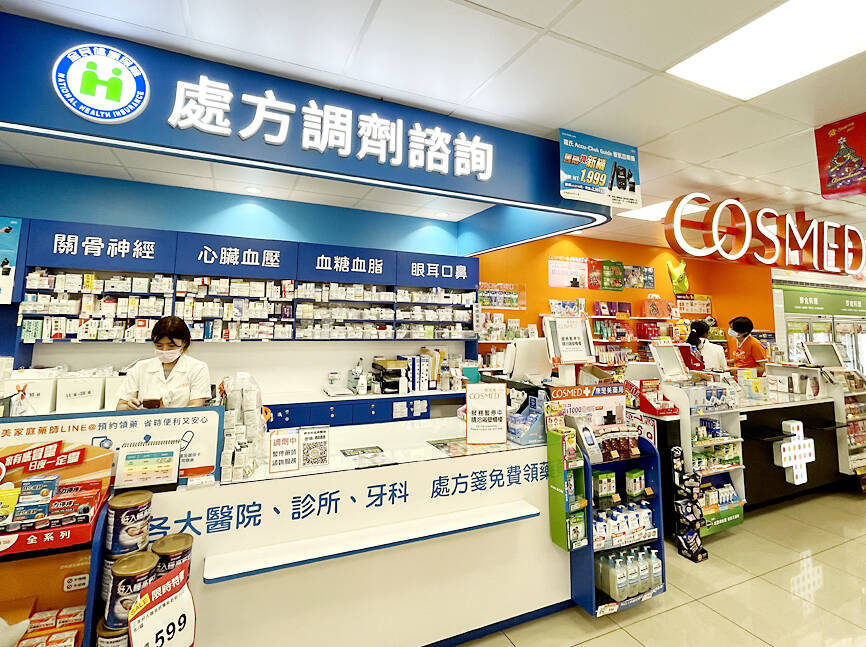Yunlin and Nantou, Taiwan’s two “super-aged” counties, have the highest density of pharmacies in the nation.
There are more than 7 million people in Taiwan with refillable prescriptions for chronic illnesses, meaning that about one out of four people need to take drugs on a regular basis.
New Taipei City has the most pharmacies in the nation, but Yunlin and Nantou counties have the highest density of pharmacies, the latest Ministry of Health and Welfare (MOHW) and Ministry of the Interior (MOI) statistics show.

Photo: Yang Ya-min, Taipei Times
The two counties have become super-aged societies — meaning that people aged 65 years or older account for more than 20 percent of the population — ahead of other cities and counties.
The MOHW’s data showed that there are 8,665 pharmacies nationwide with a license and a pharmacist or an assistant pharmacist managing their business.
Most of the nation’s pharmacies are in the six special municipalities, with 1,396 in New Taipei City, 1,155 in Taichung, 978 in Kaohsiung, 866 in Taipei, 840 in Taoyuan and 757 in Tainan.
There is an average of one pharmacy per 2,685 people nationwide, and the highest pharmacy density is in Yunlin County, with one pharmacy per 2,102 people, followed by Nantou County, with one pharmacy per 2,252 people.
The percentage of people aged 65 or older in Yunlin and Nantou counties is 20.12 percent and 20.13 percent respectively, meaning that these counties have become super-aged earlier than the National Development Council (NDC) had predicted.
The NDC predicted that Taiwan would become a super-aged society in 2025.
On the other hand, despite the percentage of people aged 65 or older in Taipei having already exceeded 20 percent, the pharmacy density in the city is one pharmacy per 2,865 people, which is lower than the average density nationwide.
In terms of dependent population — people aged 14 years or younger, and 65 years or older — the highest pharmacy densities are in Yunlin County (one pharmacy per 645 dependent people), Nantou County (one pharmacy per 685 dependent people) and Chiayi City (one pharmacy per 688 dependent people).
Taipei has the second-lowest pharmacy density for dependent people, with an average of one pharmacy per 959 dependent people, and an official said that the reason could be because Taipei has the highest amount of large hospitals in the nation, and it might therefore need less pharmacies.
Meanwhile, Cosmed and Watsons, the nation’s two largest cosmetics chain store operators that also sell non-prescription drugs, have been expanding their branches and opening pharmacies selling prescription drugs.
Shirley Kao (高秀玲), head of Uni-President’s beauty business, which runs the group’s department stores and Cosmed, last year announced that the chain would open at least 100 pharmacies, and the goal was achieved in June this year.
Watsons is planning to open its first pharmacy in the first half of next year.
Many prescription drugs can be filled at Cosmed’s pharmacies, and the company has also launched an app, allowing consumers to book an appointment to refill a prescription by uploading a photo of their prescription.
In the post-COVID-19 pandemic era, consumers have higher health consciousness, which have increased demand, Watsons Taiwan CEO Alice Huang (黃艾知) said.

An essay competition jointly organized by a local writing society and a publisher affiliated with the Chinese Communist Party (CCP) might have contravened the Act Governing Relations Between the People of the Taiwan Area and the Mainland Area (臺灣地區與大陸地區人民關係條例), the Mainland Affairs Council (MAC) said on Thursday. “In this case, the partner organization is clearly an agency under the CCP’s Fujian Provincial Committee,” MAC Deputy Minister and spokesperson Liang Wen-chieh (梁文傑) said at a news briefing in Taipei. “It also involves bringing Taiwanese students to China with all-expenses-paid arrangements to attend award ceremonies and camps,” Liang said. Those two “characteristics” are typically sufficient

A magnitude 5.9 earthquake that struck about 33km off the coast of Hualien City was the "main shock" in a series of quakes in the area, with aftershocks expected over the next three days, the Central Weather Administration (CWA) said yesterday. Prior to the magnitude 5.9 quake shaking most of Taiwan at 6:53pm yesterday, six other earthquakes stronger than a magnitude of 4, starting with a magnitude 5.5 quake at 6:09pm, occurred in the area. CWA Seismological Center Director Wu Chien-fu (吳健富) confirmed that the quakes were all part of the same series and that the magnitude 5.5 temblor was

The brilliant blue waters, thick foliage and bucolic atmosphere on this seemingly idyllic archipelago deep in the Pacific Ocean belie the key role it now plays in a titanic geopolitical struggle. Palau is again on the front line as China, and the US and its allies prepare their forces in an intensifying contest for control over the Asia-Pacific region. The democratic nation of just 17,000 people hosts US-controlled airstrips and soon-to-be-completed radar installations that the US military describes as “critical” to monitoring vast swathes of water and airspace. It is also a key piece of the second island chain, a string of

The Central Weather Administration has issued a heat alert for southeastern Taiwan, warning of temperatures as high as 36°C today, while alerting some coastal areas of strong winds later in the day. Kaohsiung’s Neimen District (內門) and Pingtung County’s Neipu Township (內埔) are under an orange heat alert, which warns of temperatures as high as 36°C for three consecutive days, the CWA said, citing southwest winds. The heat would also extend to Tainan’s Nansi (楠西) and Yujing (玉井) districts, as well as Pingtung’s Gaoshu (高樹), Yanpu (鹽埔) and Majia (瑪家) townships, it said, forecasting highs of up to 36°C in those areas